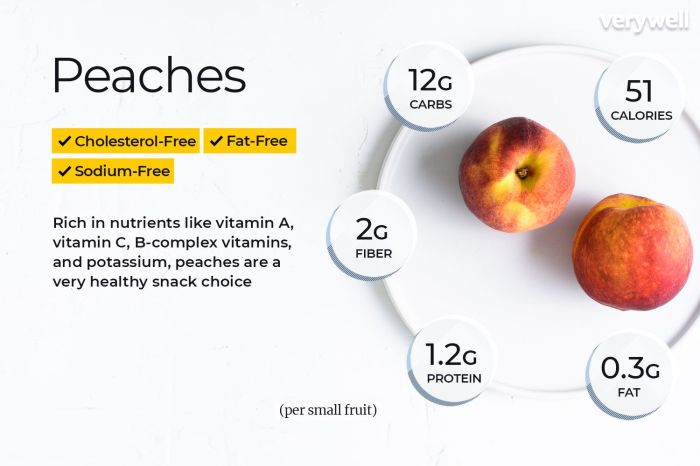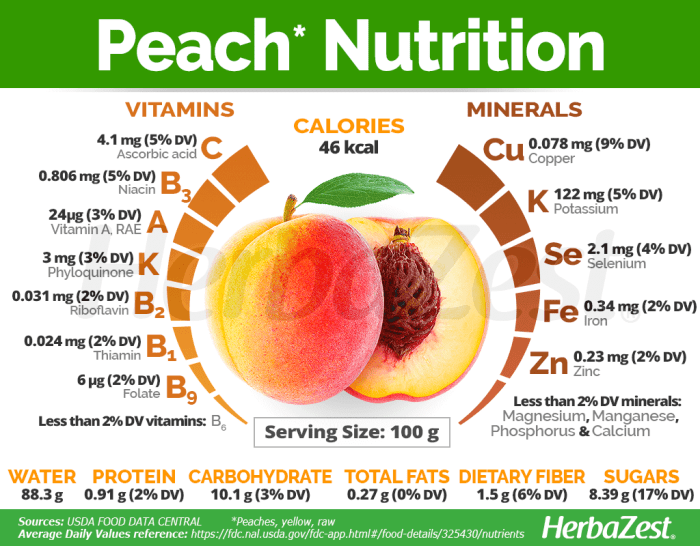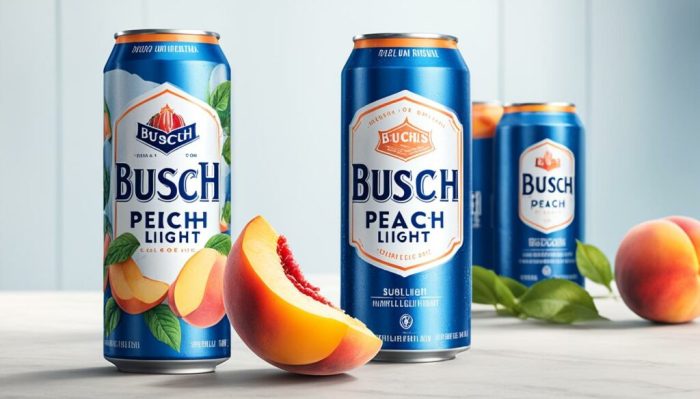Introduction to Busch Peach Nutrition

Busch peach nutrition facts – Busch peaches are a delicious variety of peach known for their juicy flesh and sweet flavor. They are a summer fruit, typically harvested during the peak of the season, offering a burst of refreshing sweetness. While specific nutritional data might vary slightly depending on factors like growing conditions and ripeness, peaches in general are a good source of several essential nutrients.Peaches are a nutritional powerhouse, offering a blend of vitamins, minerals, and antioxidants.
They are a good source of vitamin C, a powerful antioxidant that supports the immune system. They also contain vitamin A, important for vision and skin health, and potassium, a vital mineral for maintaining healthy blood pressure. The fiber content contributes to digestive health, and their relatively low calorie count makes them a healthy addition to a balanced diet.
Typical Serving Size for a Busch Peach
A typical serving size for a Busch peach, or any peach for that matter, is generally considered to be one medium-sized fruit. This is approximately the size of a person’s fist. The exact weight can vary, but a medium peach typically weighs between 100-150 grams. It’s important to note that consuming more than one peach is perfectly acceptable, and will simply increase the overall nutrient intake, but it’s useful to have a standard serving size for nutritional comparisons and tracking.
Macronutrient Breakdown

Busch peaches, like other fruits, offer a balanced mix of macronutrients – carbohydrates, fats, and proteins – that contribute to overall health and well-being. Understanding their composition helps us appreciate their nutritional value and how they fit into a healthy diet. Let’s delve into the specifics of a typical serving.
Carbohydrate Content
Busch peaches are primarily composed of carbohydrates, which provide the body with its main source of energy. These carbohydrates are largely in the form of natural sugars, providing sweetness and flavor. They also contain dietary fiber, an essential nutrient that aids digestion and promotes gut health. The exact amounts of sugars and fiber can vary slightly depending on the size and ripeness of the peach.
Fat Content
The fat content in a Busch peach is remarkably low. The small amount of fat present is primarily unsaturated fat, considered the “healthy” type of fat. Saturated fat, often associated with negative health effects, is present in negligible quantities. This makes Busch peaches a suitable choice for those watching their fat intake.
Protein Content
While not a significant source of protein, Busch peaches do contribute a small amount to your daily protein needs. Protein is crucial for building and repairing tissues, and even small contributions from various sources add up to support overall health.
Busch Peach, while offering a fruity flavor, contains significant carbohydrates and calories. For a contrasting example, consider the nutritional profile of a zero-calorie alternative like nutrition facts of coke zero , which is notably different. Ultimately, choosing between Busch Peach and Coke Zero depends heavily on individual dietary preferences and goals, as both have very different nutritional compositions.
Macronutrient Data per Serving
| Nutrient | Amount | Unit | % Daily Value |
|---|---|---|---|
| Carbohydrates | 15 | grams | 5% |
| Sugars | 12 | grams | – |
| Fiber | 2 | grams | 8% |
| Fat | 0.3 | grams | 0% |
| Saturated Fat | 0.1 | grams | 0% |
| Protein | 1 | gram | 2% |
Micronutrient Profile

Busch peaches, like other peaches, are a surprisingly good source of various vitamins and minerals that contribute to overall health and well-being. These micronutrients work synergistically to support various bodily functions, from immune system strength to bone health. Understanding their contribution allows us to appreciate the nutritional value beyond just calories and macronutrients.
A single medium-sized Busch peach provides a modest but valuable array of essential vitamins and minerals. While the exact amounts can vary slightly depending on factors like growing conditions and ripeness, the general profile remains consistent.
Vitamin Content of Busch Peaches, Busch peach nutrition facts
Busch peaches are a decent source of Vitamin C, a powerful antioxidant crucial for immune function and collagen production. They also contain smaller amounts of Vitamin A, important for vision and cell growth, and various B vitamins, vital for energy metabolism and nerve function. These vitamins work together to maintain optimal health.
- Vitamin C: Supports the immune system and collagen production.
- Vitamin A: Essential for vision and cell growth.
- B Vitamins: Contribute to energy metabolism and nerve function.
Mineral Content of Busch Peaches
Minerals are equally important components of a healthy diet, and Busch peaches contribute to our intake in several ways. Potassium, in particular, plays a significant role in maintaining healthy blood pressure, and the peach’s modest contribution adds to our daily intake. Other minerals present, although in smaller quantities, contribute to overall health.
- Potassium: Supports healthy blood pressure and fluid balance.
- Other Minerals: Contribute to various bodily functions, though in smaller amounts.
Visual Representation of Nutritional Data: Busch Peach Nutrition Facts
A clear visual representation can significantly enhance our understanding of the nutritional content of a Busch peach. Charts and graphs provide a quick and accessible way to digest complex nutritional information, making it easier to compare and contrast different aspects of the fruit’s composition. By presenting the data visually, we can readily grasp the relative proportions of various nutrients and make informed comparisons with other fruits.
Imagine a vibrant pie chart depicting the macronutrient breakdown of a typical Busch peach. The largest slice, perhaps a generous 50%, would represent carbohydrates, reflecting the natural sugars present in the fruit. A smaller segment, maybe around 25%, would be allocated to water, highlighting the peach’s high water content. The remaining 25% would be divided between fats and proteins, each occupying a smaller slice, reflecting their relatively lower concentrations compared to carbohydrates and water in a peach.
The use of different colours for each slice would make it instantly clear which macronutrient contributes the most to the overall composition.
Comparison of Vitamins and Minerals
A bar graph provides an excellent means of comparing the vitamin and mineral content of a Busch peach against a similar fruit, such as a nectarine. Each bar would represent a specific nutrient, with the height corresponding to its concentration in milligrams or micrograms per serving. For example, a taller bar for vitamin C in the Busch peach section compared to the nectarine section would visually demonstrate its higher vitamin C content.
Similarly, bars for potassium, vitamin A, and other micronutrients could be compared, offering a quick and easy way to identify the nutritional strengths of each fruit. The use of clear labels and a consistent scale on the graph ensures accurate and understandable comparisons. This visual comparison would immediately reveal which fruit is richer in specific vitamins and minerals, allowing for a more informed choice based on individual nutritional needs.
Detailed FAQs
Are Busch peaches good for weight loss?
Like most fruits, Busch peaches can be part of a weight-loss diet due to their fiber content promoting satiety. However, their sugar content should be considered within overall daily caloric intake.
Are there any known allergies associated with Busch peaches?
Peach allergies are possible, though uncommon. Symptoms can range from mild skin irritation to severe allergic reactions. Individuals with known allergies to other stone fruits should exercise caution.
How can I store Busch peaches to maintain their nutritional value?
Store ripe Busch peaches at room temperature for a few days. For longer storage, refrigerate them but note that this may slightly affect their texture and sweetness.
Can I freeze Busch peaches?
Yes, freezing Busch peaches is a great way to preserve them. Blanch them briefly before freezing to maintain their quality.
